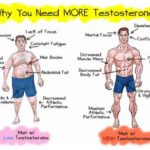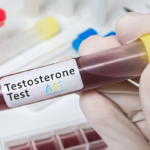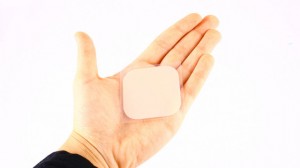What is testosterone?
Testosterone is the hormone affecting sexual desire. It is responsible for the more masculine characteristics such as facial hair and deep voices, which is why it is mainly considered to be a “male” hormone. But women also have testosterone, although it is in much smaller amounts.
Testosterone is made in women in the same way as estrogen, in that it is produced by the adrenal glands and the ovaries and also tends to gradually decline during the life of a woman. This leads to many women opting for testosterone therapy.
What should be my testosterone level?
There is actually no standardized threshold for testosterone. It has never been completely agreed what a “normal” testosterone level is. But there has been a collinear relationship identified between having a total testosterone level of below 20 ng/dl and free testosterone levels of less than 0.9 and showing the symptoms of a low libido or sexual response.
How do I interpret the Results?
Should you feel that your testosterone level is low, particularly if your test results are less than the numbers above, then you should talk to your doctor and ask about ways to replace your testosterone. Should you feel that your sexual response is too low and it is feeding into a lack of interest – which could be due to dryness, pain, lack of arousal or response or a physical release then you should think about seeking an evaluation of your disorder and then possible treatment.
Can I be too young for my levels to be checked?
Good evidence has been produced that shows that young women can have testosterone levels that are too low. Pre-menopausal women have been found to have low testosterone immediately after childbirth. Think about it – men are often known to complain that “since the baby she hadn’t been interested”. Well now you can do something about it.
If I have estrogen replacement therapy does that affect testosterone levels?
Well, you can still check your testosterone whilst you are having estrogen replacement therapy. But if you are replacing estrogen without also replacing testosterone, the testosterone that you do have binds to cells, which increases the Steroid Hormone Binding Globulin (SHBG). So less testosterone is available for the body to use and free testosterone levels decrease. So if you are taking estrogen replacement therapy you should have your testosterone levels checked and if they are low you should consider a course of combined treatment.
Can I have my testosterone levels tested if I am on birth control?
No, you are advised to come off the pill and wait for at lease 6 months in order to give your body the opportunity to readjust.
Does Testosterone therapy have any side effects?
Well, we’re not going to beat around the bush, there are some East German female athletes from the late 1970s and early 1980s who are now competing in masters events for men. And that is actually the least of some of their problems. Amongst the cocktails of drugs administered to these young ladies was a high amount of testosterone. High doses of testosterone can lead to deepening voices, increased bodily hair growth, considerable weight gain and acne. But there are some more dangerous side effects that are associated with high doses:
· Hypercalcemia (an increase in levels of blood calcium)
· Virilizations (acne, voice deepening, clitoris growth, menstrual irregularities)
· Polycythemia (increase in quantity and total volume of red blood cells)
· Edema due to sodium and water retention
· Changes in lipid levels (LDL and HDL cholesterol, triglycerides)
· Liver abnormalities, including jaundice.
So, like most things, you should take testosterone therapy in moderation and not overdo it and watch the level of your doses.
Should I be concerned about any health interactions with testosterone replacement?
Women should not have testosterone replacement should they know that they area affected by the following medical conditions:
· Kidney or Liver disease
· Low levels of HDL (“good”) cholesterol, as testosterone can make HDL even lower.
· A history of problems in the cardiac area such as heart attacks and coronary artery disease.
· A hypersensitivity to testosterone
Should I be concerned about any drugs interactions with testosterone replacement?
Yes, there are certain drugs which interact with testosterone:
· Insulin – Testosterone’s metabolic effects could decrease the insulin requirements.
· Oxyphenbutazone – an analgesic – testosterone can increase its levels
· Imipramine – an antidepressant. Testosterone increases it’s activity and imipramine increases testosterone’s activity.
· Anticoagulant medications – (Miradon, Sintrom, Warfilone, Coumadin etc.). Testosterone increases its effects which can result in bleeding problems.
What kinds of testosterone can I get?
You can get testosterone in quite a few forms. These include pure testosterone, testosterone ethanoate, synthetic methyltestosterone, or as testosterone propionate. It can be taken in a few ways – by mouth (sublingual), sprays, lozenges, capusules, patches and creams.
If I take testosterone replacement, when will I see results?
This depends on the type of testosterone you took, and can range from a few weeks up to a few months. As an example, methyltestosterone works quite quickly but DHEA takes longer than that (up to about 3 months). If you feel it is not working quickly enough, then you should not just take a larger dose before consulting your doctor about it. The side effects that result from too much testosterone can be quite serious.
My wife is taking testosterone cream, will this affect my penis at all?
In theory, this shouldn’t happen, but should you find that you are experiencing any symptoms or changes then you should immediately seek medical advice and treatment if necessary.
Is DHEA okay to use?
DHEA (Dehydroepiandosterone) has been available as an energy booster for many years. It is an androgenic steroid and can be found in the vitamin section of health food stores and pharmacies for many years. The reason we’re mentioning it here is because it has been prescribed by some doctors for women with low libido. A recent study from France indicated that it might be effective in treating low libido. But DHEA has not been regulated by the FDA in the USA , which means that you mustn’t take it without Doctor’s supervision and it is rarely prescribed as a first-line therapy.
Can I take testosterone replacement if I have had cancer or cancer is in my family history?
You should be very careful with this and you should avoid oral preparation. The same precautions that you take for estrogen should be taken for testosterone.
What is the correct dosage – and how is it applied?
Testosterone cream should be applied to the inner labia and clitoris in order to improve sensation. Thin, atrophic genital tissue can be built up by applying testosterone cream and can be found at compounding pharmacies. Experts advise a dosage of 2% testosterone in the form of cream – although you can vary it from 1 to 3%. You should apply it three times a week when you go to bed and if you have sex not on one of those days then you should apply it half an hour before sex. Make sure that you apply it carefully in the right amounts – as should you apply too much you will find increased genital growth or over-enlargement of the clitoris.
Is it Ok to try testosterone cream when trying to conceive/or having just had a baby?
You should never take testosterone if you are planning to conceive or are pregnant as the fetus could develop problems with their genital and reproductive organs.
The reason why women who have find their sexual desire dropping is because when you are breast-feeding your body releases oxytocin (a feel good chemical) which helps mother and baby bonding, but does not help desire and may even repress testosterone. But everything you take into your body goes straight to your baby, and right now your baby shouldn’t be ingesting hormones. You can’t judge whether you need testosterone until after you’ve finished breast-feeding and your body and spirit return to normal.







